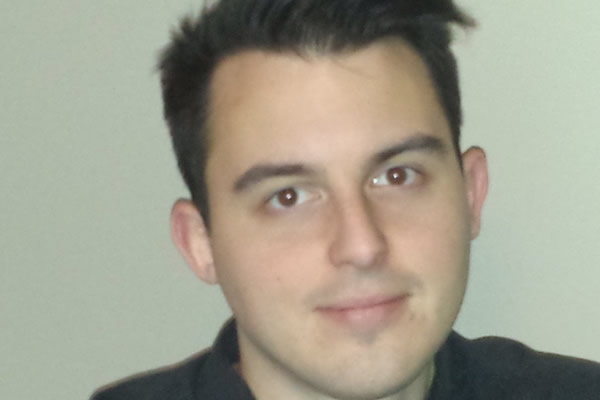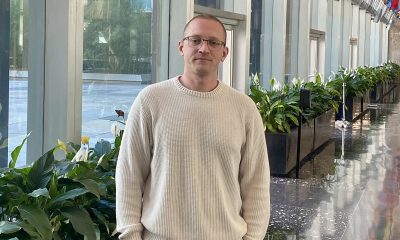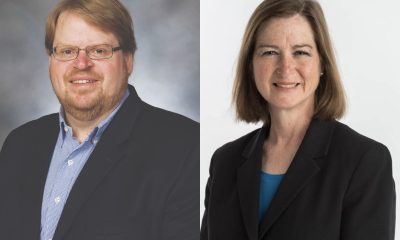National
EXCLUSIVE: Gay Russian doctor to seek asylum in U.S.
‘I have suffered persecution and discrimination in Russia’
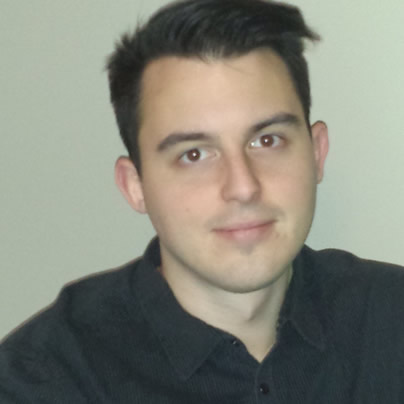
A gay Russian doctor told the Washington Blade during an exclusive interview on Feb. 7 that he plans to seek asylum in the U.S. because of anti-gay persecution he said he faced in his homeland.
“I have suffered persecution and discrimination in Russia due to my political views and sexual orientation,” said George Budny. “I am fearful for my safety, the safety of my family and friends and fearful of the fact that I will never be allowed to become a productive and successful member of society in my home country.”
Budny, who is from St. Petersburg, spoke with the Blade in Dupont Circle hours after the 2014 Olympic Games officially opened in the Black Sea resort city of Sochi – and police in his hometown and Moscow arrested 14 LGBT rights advocates. Budny and his boyfriend also attended an opening ceremony viewing party at the Human Rights Campaign.
He said he began to experience homophobia after his mother began to inquire about why the Supreme Council of the United Russia Party in Moscow replaced her and other local officials ahead of the country’s 2007 parliamentary elections.
Budny, 29, said party bosses told his mother they replaced her with a civil servant who was affiliated with Russia’s Federal Security Bureau – which succeeds the former Soviet Union’s KGB – because of him.
An employee at the Hermitage Museum in St. Petersburg told Budny’s father that she knew his ex-boyfriend with whom he was very close. An official with the Russian Ministry of Foreign Affairs told his father he had seen Budny at a gay bar.
Budny told the Blade his father realized his is gay when he found “Queer As Folk” DVDs in his apartment.
“I had to admit, yes I am, please forgive me,” said Budny.
Budny said his mother was “crying for about a year” after she learned about his sexual orientation. She thought he “turned out gay” because she had sinusitis when she was pregnant with him.
Budny told the Blade his father sent him to treatment and to female prostitutes because he said “they will fix you.”
He said his father eventually kicked him out of his family’s apartment early one morning in late 2007 because “the scandals became intolerable.” Parliamentary elections took place around the same time.
Budny told the Blade he had secretly saved $1,000 because he said he expected his parents would force him to leave their home. He said his father took the aforementioned money before he kicked him out.
“I stopped being their son and they regarded me as a cancer in the family, destroying them from within,” said Budny, noting his younger brother was only 8 years old when his father forced him to leave the family’s apartment. “The reason was to save their younger son because he didn’t know what he was dealing with.”
Life with boyfriend in St. Petersburg ‘amazing’
Budny moved in with his then-boyfriend from Malaysia with whom he studied at a St. Petersburg medical school. The couple worked and traveled to Sweden, Norway, Germany and other European countries during their relationship that lasted five years.
“We would earn money and spent it on trips,” said Budny. “It was amazing.”
Budny had a post-doctoral fellowship at an Ohio university for three years. He returned to St. Petersburg in the fall of 2011 as protests against Putin and the United Russia Party he heads took place ahead of parliamentary elections.
“I felt like I was gaining hope in Russia when I saw all these people,” Budny told the Blade, noting it was the first time he had ever seen LGBT rights advocates protesting openly. “I was impressed at how things changed when I was gone. I felt like there was a lot of freedom in the air.
He supported the opposition Yabloko party ahead of the December 2011 parliamentary elections. Budny became a member of a St. Petersburg election commission where he educated the public about voting rights, counted votes and confirmed the final results before submitting them to the authorities.
The party did not gain any seats in the Russian Duma.
Budny subsequently filed four complaints against those he felt falsified St. Petersburg election results.
“Due to the high-profile nature of my position, I was under immense scrutiny,” he told the Blade. “To my distress, I discovered election fraud and publicly exposed it (video footage, etc.) on my blog, on television and in newspapers.”
Election officials removed economist Grigory Yavlinsky, whom Yabloko nominated as its presidential candidate, from the ballot less than two months before Russians went to the polls again in March 2012.
Budny said any optimism that had remained “all ended very quickly” when Putin succeeded now Prime Minister Dmitry Medvedev during Russia’s presidential election that took place in March 2012.
Being outed at hospital ‘terrifying’
A bill St. Petersburg Legislative Assemblyman Vitaly Milonov introduced that sought to ban gay propaganda in the city became law in September 2012. A Russian law that requires non-governmental organizations that receive funding from outside the country to register as “foreign agents” took effect two months later.
Budny had been a resident at St. Petersburg’s largest hospital when the city’s law that bans gay propaganda to minors took effect in September 2012. He said a university student who worked part-time at a gay bar began working at the facility where people with HIV, Hepatitis C and other infectious diseases receive treatment on the same day the statute came into force.
Budny said other residents and their supervisors began making “derogatory and horrible jokes” against his colleague because he was “very feminine by Russian standards.”
“If I come out or if they ever find out I’m gay at my job, this would happen to me,” Budny told the Blade. “It was terrifying.”
Budny said the residents and the physicians who supervised them soon began to harass his colleague to his face. They also mistreated their patients, including an 18-year-old dancer with HIV who contracted meningitis.
“’You should be working; you’re getting all these horrible diseases,’” one of the doctors told the patient, according to Budny. “He was dying from AIDS.”
Budny said the hospital fired his colleague in December 2012 after he took sick time. He told the Blade the residents and physicians’ response was “the faggot got kicked out.”
Budny told the Blade they started “painting me with the same brush” because someone had seen the two men having lunch together and “being friendly.”
“That hate campaign started against me,” said Budny. “I had to make up a girlfriend story. It was just a really bad story.”
Budny told the Blade the St. Petersburg gay propaganda law made it illegal for him and other hospital staff to talk about LGBT topics with any patient who was younger than 18. These include anal sex and other risk factors associated with contracting HIV.
“Do I violate the Hippocratic oath or do I violate the propaganda law,” said Budny. “Either way I should be making compromises on my professional level or on my legal level. I can’t focus on my professional growth under this condition.”
Anti-gay attacks in St. Petersburg
Budny said he has been attacked three times since 2009 because of his sexual orientation.
He told the Blade more than half a dozen men whom he described as “skinheads” tried to choke him with a thick metal chain while he and his then-boyfriend walked through a theater district near St. Petersburg’s largest park.
Budny said the second incident took place after he and his then-boyfriend from Malaysia left Central Station, a gay club in St. Petersburg. Its owners also operate a gay bar in Moscow outside of which two men opened fire last November.
Budny told the Blade the third attack took place “just out of nowhere” last year as he walked home from a St. Petersburg Metro station late at night. Budny, who is Jewish, said two skinheads called him a “faggot” and used anti-Semitic slurs during the attack.
He said his assailants punched him in the face and broke his nose before he ran into a nearby restaurant.
Skinheads are among those who frequently joined Milonov at anti-gay rallies in St. Petersburg. Budny filed a complaint with city prosecutors late last year that urges them to investigate the lawmaker for voter fraud.
Budny told the Blade that his supervisor told him after he completed his residency in January 2013 that hospital administrators didn’t “want to see me anymore.” He noted the 2012 presidential election results showed nearly everyone at the hospital backed Putin, even though Budny said some of his colleagues said they never even voted.
“I found it out too late unfortunately and realized my hospital officials really, really hate me for exposing the election fraud in my own precinct,” he told the Blade. “I realized what can I do if this will be happening in every clinic that I go to. I want to be a physician I don’t want to quit.”
Mother: Stay in U.S. because of propaganda law
He received a student visa and arrived in the U.S. less than three weeks before Putin last June signed a bill that sought to ban gay propaganda to minors into law.
Budny currently lives near Union Station in D.C. as he studies at Kaplan University near Dupont Circle to secure the necessary credentials to apply for a residency program. His roommate introduced him to his boyfriend shortly after he arrived in the nation’s capital.
Budny told the Blade he speaks with his mother, although she remains uncomfortable with his sexual orientation. He has not spoken with his father since he kicked him out of the family apartment in 2007.
Budny said his mother has told him to stay in the U.S. because of Russia’s gay propaganda law.
“She is afraid for the safety of my younger brother and all of us,” said Budny.
He said authorities last month conducted what he described as an emergency inspection on the St. Petersburg children’s clinic he and his mother opened more than a decade ago.
Budny told the Blade the officials wanted to investigate the building’s electrical and plumbing systems, the windows and whether the first-floor of the apartment building in which the facility is located had been properly zoned. He said local officials in 2009 allowed the clinic to move into the building.
“They are attacking us by basically saying we are starting a clinic in an apartment building,” said Budny. “My mother is sure that this happened right after I filed my complaint against [Milonov].”
Budny told the Blade a D.C. lawyer has begun working on his asylum case. He expects she will formally file his petition with the U.S. government in the coming weeks.
“Right now I realize there is no way back,” said Budny, discussing Russia’s gay propaganda law. “They’re not going to repeal it. It’s going to be reinforced.”
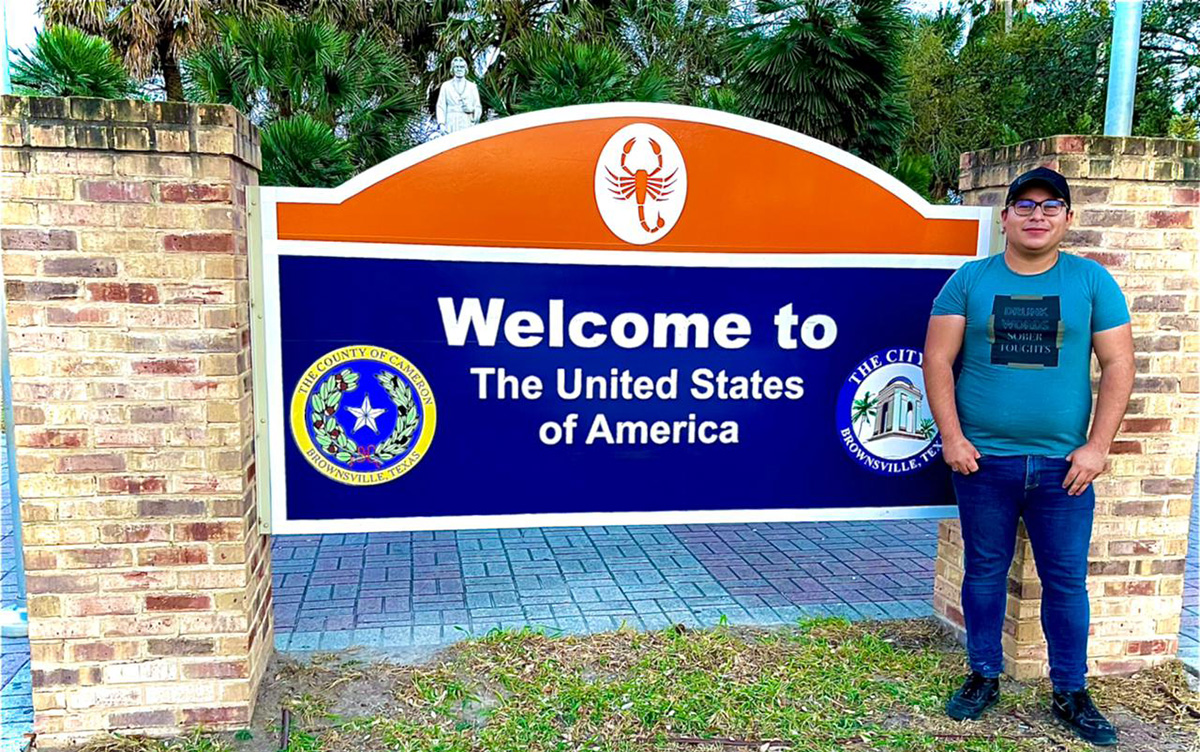
The U.S. has granted asylum to a Guatemalan LGBTQ activist who fled his country in 2019.
Estuardo Cifuentes and his partner ran a digital marketing and advertising business in Guatemala City.
He previously told the Washington Blade that gang members extorted from them. Cifuentes said they closed their business after they attacked them.
Cifuentes told the Blade that Guatemalan police officers attacked him in front of their home when he tried to kiss his partner. Cifuentes said the officers tried to kidnap him and one of them shot at him. He told the Blade that authorities placed him under surveillance after the incident and private cars drove past his home.
Cifuentes arrived in Matamoros, a Mexican border city that is across the Rio Grande from Brownsville, Texas, in June 2019. He asked for asylum in the U.S. based on the persecution he suffered in Guatemala because of his sexual orientation.
The Trump administration forced Cifuentes to pursue his asylum case from Mexico under its Migrant Protection Protocols program that became known as the “remain in Mexico” policy.
Cifuentes while in Matamoros ran Rainbow Bridge Asylum Seekers, a program for LGBTQ asylum seekers and migrants that the Resource Center Matamoros, a group that provides assistance to asylum seekers and migrants in the Mexican border city, helped create.
The Biden-Harris administration in January 2021 suspended enrollment in MPP. Cifuentes entered the U.S. on March 3, 2021.
“We are profoundly relieved and grateful that my husband and I have been officially recognized as asylees in the United States,” Cifuentes told the Blade on Monday in an email. “This result marks the end of a long and painful fight against the persecution that we faced in Guatemala because of our sexual orientation.”
Vice President Kamala Harris is among those who have said discrimination and violence based on sexual orientation are among the root causes of migration from Guatemala and other countries in Central America.
Cifuentes is now the client services manager for Lawyers for Good Government’s Project Corazón, a campaign that works “hard to reunite and defend the rights of families impacted by inhumane immigration policies.” He told the Blade he will continue to help LGBTQ asylum seekers and migrants.
“In this new chapter of our lives, we pledge to work hard to support others in similar situations and to contribute to the broader fight for the rights and acceptance of the LGBTQ+ migrant community,” said Cifuentes. “We are hopeful that our story will serve as a call to action to confront and end persecution based on gender identity and sexual orientation.”
U.S. Supreme Court
US Supreme Court rules Idaho to enforce gender care ban
House Bill 71 signed in 2023


BY MIA MALDONADO | The U.S. Supreme Court has allowed Idaho to enforce House Bill 71, a law banning Idaho youth from receiving gender-affirming care medications and surgeries.
In an opinion issued Monday, the U.S. Supreme Court granted the state of Idaho’s request to stay the preliminary injunction, which blocked the law from taking effect. This means the preliminary injunction now only applies to the plaintiffs involved in Poe v. Labrador — a lawsuit brought on by the families of two transgender teens in Idaho who seek gender-affirming care.
Monday’s Supreme Court decision enforces the gender-affirming care ban for all other trans youth in Idaho as the lawsuit remains ongoing in the Ninth Circuit Court of Appeals.

The American Civil Liberties Union and the ACLU of Idaho, both of whom represent the plaintiffs, said in a press release Monday that the ruling “does not touch upon the constitutionality” of HB 71. The groups called Monday’s ruling an “awful result” for trans Idaho youth and their families.
“Today’s ruling allows the state to shut down the care that thousands of families rely on while sowing further confusion and disruption,” the organizations said in the press release. “Nonetheless, today’s result only leaves us all the more determined to defeat this law in the courts entirely, making Idaho a safer state to raise every family.”
Idaho Attorney General Raúl Labrador in a press release said the state has a duty to protect and support all children, and that he is proud of the state’s legal stance.
“Those suffering from gender dysphoria deserve love, support and medical care rooted in biological reality,” Labrador said. “Denying the basic truth that boys and girls are biologically different hurts our kids. No one has the right to harm children, and I’m grateful that we, as the state, have the power — and duty — to protect them.”
Recap of Idaho’s HB 71, and what led to SCOTUS opinion
Monday’s Supreme Court decision traces back to when HB 71 was signed into law in April 2023.
The law makes it a felony punishable for up to 10 years for doctors to provide surgeries, puberty-blockers and hormones to trans people under the age of 18. However, gender-affirming surgeries are not and were not performed among Idaho adults or youth before the bill was signed into law, the Idaho Capital Sun previously reported.
One month after it was signed into law, the families of two trans teens sued the state in a lawsuit alleging the bill violates the 14th Amendment’s guarantee of equal protection under the law.
In late December, just days before the law was set to take effect in the new year, U.S. District Judge B. Lynn Winmill blocked the law from taking effect under a preliminary injunction. In his decision, he said he found the families likely to succeed in their challenge.
The state of Idaho responded by appealing the district court’s preliminary injunction decision to the Ninth Circuit, to which the Ninth Circuit denied. The state of Idaho argued the court should at least enforce the ban for everyone except for the plaintiffs.
After the Ninth Circuit’s denial, the Idaho Attorney General’s Office in February sent an emergency motion to the U.S. Supreme Court, the Idaho Press reported. Monday’s U.S. Supreme Court decision agrees with the state’s request to enforce its ban on trans health care for minors, except for the two plaintiffs.
******************************************************************************************

Mia Maldonado joined the Idaho Capital Sun after working as a breaking news reporter at the Idaho Statesman covering stories related to crime, education, growth and politics. She previously interned at the Idaho Capital Sun through the Voces Internship of Idaho, an equity-driven program for young Latinos to work in Idaho news. Born and raised in Coeur d’Alene, Mia moved to the Treasure Valley for college where she graduated from the College of Idaho with a bachelor’s degree in Spanish and international political economy.
******************************************************************************************
The preceding piece was previously published by the Idaho Capital Sun and is republished with permission.
The Idaho Capital Sun is the Gem State’s newest nonprofit news organization delivering accountability journalism on state politics, health care, tax policy, the environment and more.
We’re part of States Newsroom, the nation’s largest state-focused nonprofit news organization.
Kansas
Kansas governor vetoes ban on health care for transgender youth
Republican lawmakers have vowed to override veto
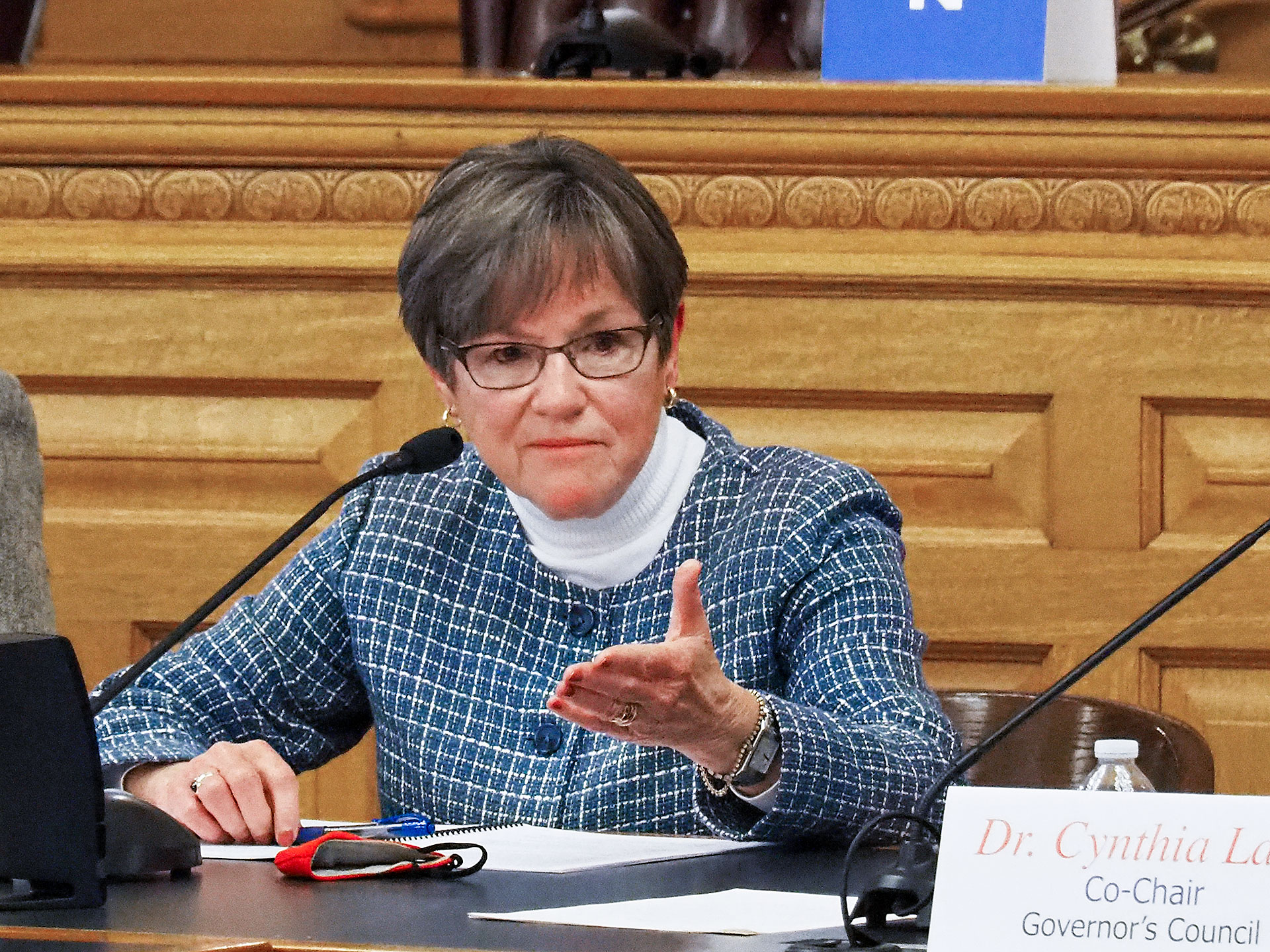

BY TIM CARPENTER | Gov. Laura Kelly flexed a veto pen to reject bills Friday prohibiting gender identity health care for transgender youth, introducing a vague crime of coercing someone to have an abortion and implementing a broader survey of women seeking abortion that was certain to trigger veto override attempts in the Republican-led House and Senate.
The decisions by the Democratic governor to use her authority to reject these health and abortion rights bills didn’t come as a surprise given her previous opposition to lawmakers intervening in personal decisions that she believed ought to remain the domain of families and physicians.
Kelly said Senate Bill 233, which would ban gender-affirming care for trans minors in Kansas, was an unwarranted attack on a small number of Kansans under 18. She said the bill was based on a politically distorted belief the Legislature knew better than parents how to raise their children.
She said it was neither a conservative nor Kansas value to block medical professionals from performing surgery or prescribing puberty blockers for their patients. She said stripping doctors of their licenses for serving health interests of patients was wrong. Under the bill, offending physicians could be face lawsuits and their professional liability insurance couldn’t be relied on to defend themselves in court.
“To be clear, this legislation tramples parental rights,” Kelly said. “The last place that I would want to be as a politician is between a parent and a child who needed medical care of any kind. And, yet, that is exactly what this legislation does.”
Senate President Ty Masterson (R-Andover) and House Speaker Dan Hawkins (R-Wichita) responded to the governor by denouncing the vetoes and pledging to seek overrides when legislators returned to the Capitol on April 26. The trans bill was passed 27-13 in the Senate and 82-39 in the House, suggesting both chambers were in striking distance of a two-thirds majority necessary to thwart the governor.
“The governor has made it clear yet again that the radical left controls her veto pen,” Masterson said. “This devotion to extremism will not stand, and we look forward to overriding her vetoes when we return in two weeks.”
Cathryn Oakley, senior director of the Human Rights Campaign, said the ban on crucial, medically necessary health care for trans youth was discriminatory, designed to spread dangerous misinformation and timed to rile up anti-LGBTQ activists.
“Every credible medical organization — representing over 1.3 million doctors in the United States — calls for age-appropriate, gender-affirming care for transgender and nonbinary people,” Oakley said. “This is why majorities of Americans oppose criminalizing or banning gender-affirming care.”
Abortion coercion
Kelly also vetoed House Bill 2436 that would create the felony crime of engaging in physical, financial or documentary coercion to compel a girl or woman to end a pregnancy despite an expressed desire to carry the fetus to term. It was approved 27-11 in the Senate and 82-37 in the House, again potentially on the cusp of achieving a veto override.
The legislation would establish sentences of one year in jail and $5,000 fine for those guilty of abortion coercion. The fine could be elevated to $10,000 if the adult applying the pressure was the fetuses’ father and the pregnant female was under 18. If the coercion was accompanied by crimes of stalking, domestic battery, kidnapping or about 20 other offenses the prison sentence could be elevated to 25 years behind bars.
Kelly said no one should be forced to undergo a medical procedure against their will. She said threatening violence against another individual was already a crime in Kansas.
“Additionally, I am concerned with the vague language in this bill and its potential to intrude upon private, often difficult, conversations between a person and their family, friends and health care providers,” the governor said. “This overly broad language risks criminalizing Kansans who are being confided in by their loved ones or simply sharing their expertise as a health care provider.”
Hawkins, the House Republican leader, said coercion was wrong regardless of the circumstances and Kelly’s veto of the bill was a step too far to the left.
“It’s a sad day for Kansas when the governor’s uncompromising support for abortion won’t even allow her to advocate for trafficking and abuse victims who are coerced into the procedure,” Hawkins said.
Emily Wales, president and CEO of Planned Parenthood Great Plains Votes, said HB 2436 sought to equate abortion with crime, perpetuate false narratives and erode a fundamental constitutional right to bodily autonomy. The bill did nothing to protect Kansas from reproductive coercion, including forced pregnancy or tampering with birth control.
“Planned Parenthood Great Plains Votes trusts patients and stands firmly against any legislation that seeks to undermine reproductive rights or limit access to essential health care services,” Wales said.
Danielle Underwood, spokeswoman for Kansas for Life, said “Coercion Kelly” demonstrated with this veto a lack of compassion for women pushed into an abortion.
The abortion survey
The House and Senate approved a bill requiring more than a dozen questions be added to surveys of women attempting to terminate a pregnancy in Kansas. Colorful debate in the House included consideration of public health benefits of requiring interviews of men about reasons they sought a vasectomy birth control procedure or why individuals turned to health professionals for treatment of erectile dysfunction.
House Bill 2749 adopted 81-39 in the House and 27-13 in the Senate would require the Kansas Department of Health and Environment to produce twice-a-year reports on responses to the expanded abortion survey. The state of Kansas cannot require women to answer questions on the survey.
Kelly said in her veto message the bill was “invasive and unnecessary” and legislators should have taken into account rejection in August 2022 of a proposed amendment to the Kansas Constitution that would have set the stage for legislation further limiting or ending access to abortion.
“There is no valid medical reason to force a woman to disclose to the Legislature if they have been a victim of abuse, rape or incest prior to obtaining an abortion,” Kelly said. “There is also no valid reason to force a woman to disclose to the Legislature why she is seeking an abortion. I refuse to sign legislation that goes against the will of the majority of Kansans who spoke loudly on Aug. 2, 2022. Kansans don’t want politicians involved in their private medical decisions.”
Wales, of Planned Parenthood Great Plains Votes, said the bill would have compelled health care providers to “interrogate patients seeking abortion care” and to engage in violations of patient privacy while inflicting undue emotional distress.
Hawkins, the Republican House speaker, said the record numbers of Kansas abortions — the increase has been driven by bans or restrictions imposed in other states — was sufficient to warrant scrutiny of KDHE reporting on abortion. He also said the governor had no business suppressing reporting on abortion and criticized her for tapping into “irrational fears of offending the for-profit pro-abortion lobby.”
******************************************************************************************

Tim Carpenter has reported on Kansas for 35 years. He covered the Capitol for 16 years at the Topeka Capital-Journal and previously worked for the Lawrence Journal-World and United Press International.
The preceding story was previously published by the Kansas Reflector and is republished with permission.
******************************************************************************************
The Kansas Reflector is a nonprofit news operation providing in-depth reporting, diverse opinions and daily coverage of state government and politics. This public service is free to readers and other news outlets. We are part of States Newsroom: the nation’s largest state-focused nonprofit news organization, with reporting from every capital.
-

 Africa2 days ago
Africa2 days agoCongolese lawmaker introduces anti-homosexuality bill
-

 Colorado4 days ago
Colorado4 days agoFive transgender, nonbinary ICE detainees allege mistreatment at Colo. detention center
-

 World3 days ago
World3 days agoOut in the World: LGBTQ news from Europe and Asia
-

 Real Estate4 days ago
Real Estate4 days agoBoosting your rental property’s curb appeal

